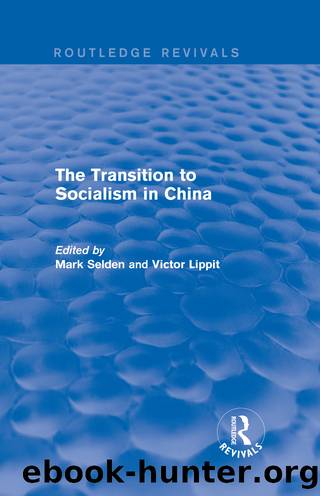The Transition to Socialism in China (Routledge Revivals) by Mark Selden Victor Lippit

Author:Mark Selden, Victor Lippit [Mark Selden, Victor Lippit]
Language: eng
Format: epub
ISBN: 9780873322126
Google: uOaRva1aWpUC
Publisher: M.E. Sharpe
Published: 1982-01-15T16:12:50+00:00
This position, similar to Tito's, seemed a nationalist heresy to Stalin. Liu and Mao insisted that the patriotic bourgeoisie could participate in anti-imperialist struggles and side with the forces of socialism in the colonial and semicolonial world which contained most of the earth's people and therefore would decide the fate of the species. Stalin, on the other hand, insisted that the fate of the first socialist state, his Soviet Union, was the essence of international struggle. The difference was decisive. Mao's Stalinist adversary Wang Ming wrote, as he no doubt told Stalin, that on October 4 and 5, 1941, he and Mao had argued fiercely. 'I said anti-Japanese military operations in China had to be stepped up to deny Japan any chance of helping the Nazi offensive against the Soviet Union. Mao objected ... I intimated that his line was anti-Soviet...."7
In short, Mao played the role of a Titoist (putting socialism in his nation before Moscow's global interests) long before Tito's act gave the part meaning. Mao naturally put first leading an independent Chinese nation toward socialism. Hence when Tito gave content to the crime of which Mao had long stood accused, it had to create a crisis within the Chinese leadership. Mao had always claimed that fighting wars of national liberation was proletarian internationalism and best advanced the cause of socialism. Tito's partisans had fought such a war. But Yugoslav national independence lead to a life and death conflict with what Stalin insisted was proletarian internationalism.
Nonetheless, if China's war-torn economy, hungry people, and unfulfilled great dreams were to come alive in a world where the United States was threatening to blockade and embargo Mao's China, and if Western Europe and Japan were dependent on the United States, what alternative was there to turning to Stalin? Observers of virtually every political stripe agree that Stalin imposed harsh terms hoping to make China dependent and subservient. Soviet scholar, L. Z. Kopelev found,
The successes of the Chinese Communists disturbed Stalin.... It was in those years ... that the conflict with Yugoslavia began.... Mao, was undoubtedly stronger and more dangerous than Tito.... Therefore,... Stalin imposed unequal treaty concessions... holding fast to the Chinese Eastern Railway, the naval bases at Port Arthur and Dairen and Sinkiang.... At the same time there was an attempt to implant Soviet military advisers in all major Chinese army units and institutions. Stalin [ wanted to] ... make it [ China] more dependent.8
One top Chinese Party leader, Gao Gang, may have tried to link himself and China most closely to Stalin's Soviet Union. Professor James Hsiung finds that Gao bid "for Soviet favor" during the debate over the Tito-Stalin rift by being "outspoken in urging a selfless internationalism bordering on servitude to Soviet supremacy."9 In contrast to Gao's posture of subordination, and to the eventual policy stated by Liu of keeping open the possibility of a Soviet alliance while maximizing strategic independence, there was a third possibility: to avoid entangling alliances and preserve maximum room for maneuver.
Zhou Enlai may have headed this third group.
Download
This site does not store any files on its server. We only index and link to content provided by other sites. Please contact the content providers to delete copyright contents if any and email us, we'll remove relevant links or contents immediately.
Harry Potter and the Goblet Of Fire by J.K. Rowling(3045)
Never by Ken Follett(2880)
Shadow of Night by Deborah Harkness(2718)
Ogilvy on Advertising by David Ogilvy(2682)
Zero to IPO: Over $1 Trillion of Actionable Advice from the World's Most Successful Entrepreneurs by Frederic Kerrest(2395)
The Man Who Died Twice by Richard Osman(2299)
Machine Learning at Scale with H2O by Gregory Keys | David Whiting(2291)
Book of Life by Deborah Harkness(2263)
How Proust Can Change Your Life by Alain De Botton(2261)
My Brilliant Friend by Elena Ferrante(2223)
0041152001443424520 .pdf by Unknown(2220)
The Tipping Point by Malcolm Gladwell(2204)
How to Pay Zero Taxes, 2018 by Jeff A. Schnepper(2099)
Will by Will Smith(2042)
Purple Hibiscus by Chimamanda Ngozi Adichie(1981)
Hooked: A Dark, Contemporary Romance (Never After Series) by Emily McIntire(1959)
Borders by unknow(1785)
Rationality by Steven Pinker(1765)
Daughter of Smoke and Bone by Laini Taylor(1744)
